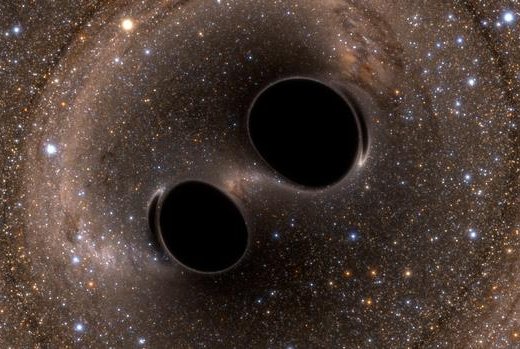A pair of L-shaped antennas have recorded the massive gravitational waves created by the ancient collision of two black holes. Photo by LIGO/Caltech
WASHINGTON, Feb. 11 (UPI) -- A monumental first promises to revolutionize the fields of astronomy and cosmology. A team of astronomers have confirmed the existence of gravitational waves, ripples in the fabric of space-time.
The waves were detected by the Laser Interferometer Gravitational-wave Observatory, or LIGO, a pair of L-shaped antennas attuned to the cosmos in Washington and Louisiana.
The waves picked up by the antennas were produced by the ancient collision of two black holes 1.3 billion years ago -- a collision that continues to reverberate through space with an energy 50 times greater than that of all the stars in the universe.
The discovery was announced Thursday morning at the National Press Club in Washington, D.C.
"Ladies and gentlemen, we have detected gravitational waves. We did it!" David Reitze, the executive director of the LIGO project, told an excited gathering of reporters.
The echo of the ancient collision lasted only a half-second, but LIGO's antennas captured it. Within the half-second clip, scientists say, are the details of a violent mashup of two black holes. As they came together, the black holes spun about each other, churning up the cosmic surroundings. As the two black holes finally became one, a massive blast of energy was propelled throughout the cosmos.
And that blast of energy, recorded in Louisiana and Washington, looks remarkably similar to the gravitational waves predicted by Einstein's theory of relativity.
"The description of this observation is beautifully described in the Einstein theory of general relativity formulated 100 years ago and comprises the first test of the theory in strong gravitation," Rainer Weiss, who initiated the LIGO project in the 1980s, said in a news release. "It would have been wonderful to watch Einstein's face had we been able to tell him."
Until now, the study of black holes has been largely theoretical. But the new discovery will allow scientists to more directly study the phenomena of black holes, dark matter and dark energy -- phenomena that have been mostly invisible to astronomers.
"We're missing some of the most violent, dynamic and exciting things in the universe," Cole Miller, an astronomer at the University of Maryland who didn't work on LIGO, told USA Today. "[Gravitational waves are] going to give us a remarkable view into a universe that has largely been denied us."
"[They will] allow us to see almost into the heart of a black hole," added Arizona State University's Lawrence Krauss, also unaffiliated with LIGO.
The scientific paper describing the major discovery is set to be published in the journal Physical Review Letters. But scientists hope the paper is just the beginning.
Astronomers say they detected a much smaller gravitational wave signal a week before the major discovery, and believe many more gravitational waves will be detected and measured moving forward.
"Whenever first detection happens, there's gonna be a party, no question," MIT astrophysicist Scott Hughes, who wasn't on the LIGO team, told Gizmodo. "But after that, when detection becomes routine, is when things start getting really interesting."















